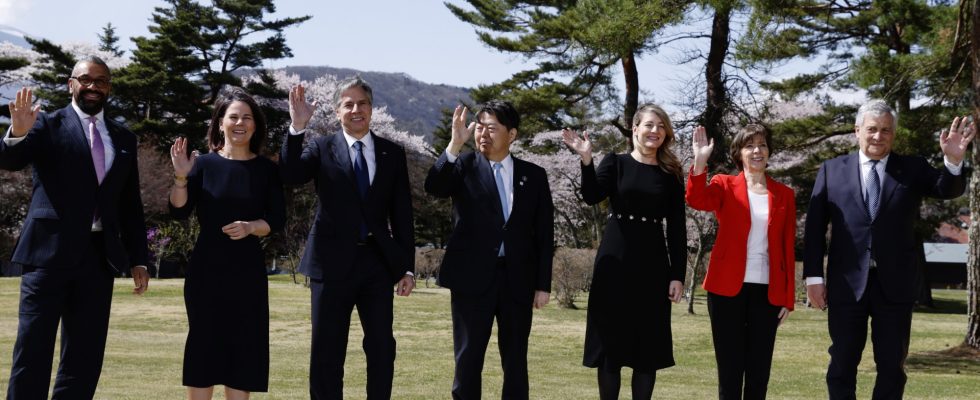Status: 04/18/2023 07:54 a.m
In their final declaration, the G7 states address China and Russia with unusual clarity. Beijing must end its aggressive drive for power. And there is another stop signal – for Kremlin boss Putin.
The G7 group of economically strong democracies has unequivocally called on China to comply with international rules. “We remind China of the need to uphold the goals and principles of the United Nations Charter and to refrain from threats, coercion, intimidation or the use of force,” said the joint statement adopted at the conclusion of the G7 foreign ministers’ meeting in Karuizawa, Japan Explanation.
The foreign ministers also clearly criticized the Chinese actions in the South China Sea. “There is no legal basis for China’s expansive maritime claims in the South China Sea, and we oppose China’s militarization activities in the region,” the document said.
“Baerbock is obviously very satisfied with the summit”, Ulrich Mendgen, ARD Tokyo, currently Karuizawa, on the G7 meeting
Tagesschau 2:00 p.m., April 17, 2023
Ukraine will be supported “as long as necessary”.
The group also addressed decisive words to Russia. The states are ready to tighten sanctions against Moscow because of the aggressive war against Ukraine. “We remain committed to stepping up sanctions against Russia.” They will also “intensify coordination to prevent third-party arms deliveries to Russia.”
Action would be taken against those who materially support Russia’s war against Ukraine. Once again, the Round of Seven called on Russia to withdraw immediately and unconditionally from the neighboring country. Ukraine will be supported “as long as necessary” in its defense against the aggressor.
Any solution to the conflict must ensure that Russia pays for the damage it has caused itself. There should be no impunity for war crimes and other atrocities such as attacks on civilians and critical civilian infrastructure.
Condemnation of Russian “nuclear rhetoric”
The G7 reaffirmed their commitment to a world without nuclear weapons. There are concerns about Russia’s willingness to conduct nuclear tests and suspend participation in the “New Start” agreement. This agreement limits the nuclear arsenals of the US and Russia.
The seven states condemned Russia’s irresponsible nuclear rhetoric and its threat to station nuclear weapons in Belarus.” The final declaration warned: “Any use of chemical, biological or nuclear weapons by Russia would have serious consequences.” Last month, the Russian President Vladimir Putin announced plans to station strategic nuclear weapons in Belarus.
Concern about Chinese nuclear arsenal
The G7 is concerned about “the ongoing and accelerated expansion of China’s nuclear arsenal and the development of ever more sophisticated delivery systems.” China was urged to “promptly engage in talks with the US on reducing strategic risk and promoting stability through greater transparency of China’s nuclear weapons policy, plans and capabilities.”
The G7 also took a stand on the human rights situation in China. One is concerned about human rights violations in Tibet and Xinjiang. China’s central government has long been accused of the systematic repression of Muslim Uyghurs in western Xinjiang province.
Despite the criticism, the G7 countries want to work with China on global challenges such as climate change. They are willing to “build constructive and stable relations through dialogue and promote global economic recovery and people-to-people exchanges in a mutually beneficial manner,” the statement said.
Preparation for the G7 summit in Hiroshima
Japan’s Foreign Minister Yoshimasa Hayashi, as the host, expressed his satisfaction with the results of the G7 meeting. It was “a great success” as it “confirmed our firm opposition to attempts to change the status quo,” Hayashi said against the background of Russia’s war against Ukraine and China’s drive for power.
In addition to Germany and Japan, the group of seven economically strong countries also includes France, Italy, Canada, the USA and Great Britain. Japan currently holds the presidency. The meeting in the holiday resort of Karuizawa also served to prepare for the G7 summit of heads of state and government in Hiroshima in May, to which Chancellor Scholz will travel.

